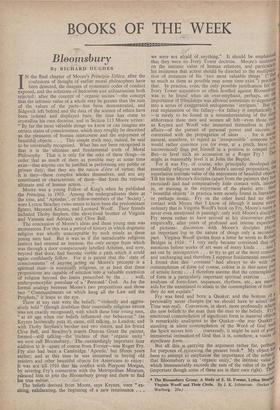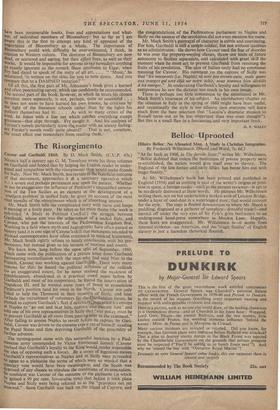BOOKS OF THE WEEK
Bloomsbury
By RICHARD HUGHES
IN the final chapter of Moore's Principia Ethica, after the confusions of thought of earlier moral philosophers have been detected, the dangers of systematic codes of conduct exposed, and the solutions of hedonism and utilitarianism both rejected : after the concept of 'organic unities '—the concept that the intrinsic value of a whole may be greater than the sum of the values of the parts—has been demonstrated, and Sidgwick left behind and the data of the science of ethics have been isolated and displayed bare, the time , has come to crystallise his own doctrine, and in Section 113 Moore writes: "By far the most valuable things we know or can imagine are certain states of consciousness, which may roughly be described as the pleasures of human intercourse and the enjoyment of beautiful objects. . . . This simple truth may, indeed, be said to be universally recognised. What has not been recognised is that it is the ultimate and fundamental truth of Moral Philosophy. That it is only for the sake of these things—in order that as much of them as possible may at some time exist—that anyone can be justified in performing any public or private duty; that they are the raison d'être of virtue; that • it is they—these complex wholes themselves, and not any Constituent or characteristic of them—that form the rational ultimate end of human action. . . ."
Moore was a young Fellow of King's. when he published the Principia, in 1903. Among the undergraduates there at the time, and ' Apostles ', or fellow-members of the ' Society ', were Lytton Strachey (who seems to have been the predominant figure), Maynard Keynes, and Leonard Woolf. Their friends included Thoby Stephen, (the short-lived brother of Virginia and Vanessa and Adrian), and Clive Bell.
The concussion of Moore's ideas and these young men was momentous. For this was a period of history in which dogmatic religion was wholly unacceptable by such minds as these young men had. But it was as if the ineradicable religious instinct had entered an impasse, the only escape from which was through a door conspicuously labelled Atheism, and now, beyond that door, had become visible a path which it could again confidently follow. For it is patent that the 'state of consciousness' of anyone acting on Moore's precepts is a spiritual state—is essentially religious, or at least that these propositions are capable of erection into a valuable extension of religion beyond the limits prescribed by the . . . well, anthropomorphic postulate of a ' Personal ' God. As for the formal analogy between Moore's two propositions and those two "Commandments on which hang all the Law and the Prophets," it leaps to the eye. . These at any rate were the beliefs, "violently and aggres- sively held" (though doubtless their essentially religious nature was not exactly recognised), with which these four young men, "at an age when our beliefs influenced our behaviour" (as Keynes laconically puts it), came, still talking, to London; and with Thoby Stephen's brother and two sisters, and his friend Clive. Bell, and Strachey's cousin Duncan Grant the painter, formed—still talking—the nucleus of that 'organic unity' we now call Bloomsbury. The outstandingly important later addition to it—apart of course from Forster—was Roger Fry. Fry also had been a Cambridge 'Apostle,' but fifteen years earlier; and at this time he was immersed in buying old masters and other beautiful objects for Americans to enjoy: It was not till 1910 that his conflict with Pierpont Morgan, by severing Fry's connection with the Metropolitan Museum, released him to join the Bloomsbury group and there to find his true metier.
The beliefs derived from Moore, says Keynes, were " ex- citing, exhilarating, the beginning of a new renaissance . . . we were not afraid of anything." It should be emphasised that they were no Ivory Tower doctrine. Moore's insistence on the intrinsic value of human relations, and particularlY his insistence that action should be directed to the multiplica, non of instances of his 'two most valuable things' ("t11 as much as them as possible may some time exist ") preclude that. In practice, even, the only possible justification for tili Ivory Tower accusation so often levelled against Bloomsluir, was to be found when an over-emphasis, perhaps, on ale importance of friendships was allowed sometimes fo degenerate into a series of exaggerated. endogamous 'intrigues.' But lir real explanation of the fallacy—for fallacy it emphatically 15 —is surely to be found in a misunderstanding of the deeE abhorrence these men and women all felt—even those suc? as Keynes and Woolf who immersed themselves in pub1,1° affairs—of the pursuit of personal power and success, 3; contrasted with the propagation of ideas . . . for it seell2„' natural, somehow, to regard as ' irresponsible ' someone 0' would rather convince you (or even, at a pinch, leave Y°11 unconvinced) than put himself in a position to compel You' But—to level such an accusation at a Roger Fry ! One might as reasonably level it at John the Baptist. For it was Fry, of course, who principally developed tl,le essentially religious nature of Moore's second proposition, ine superlative intrinsic value of the enjoyment of beautiful objeels,i Till his time Moore's disciples (apart from the painters they ha': • recruited) had had comparatively little contact with, inter& in, or training in the enjoyment of the plastic arts: their 'beautiful objects' in practice were mostly found in literature.' or perhaps music. Fry on the other hand had no direr' contact with Moore that I know of (though it seems extra: ordinary that in Virginia Woolf's book on Fry, Moore's narne never even mentioned in passing): only with Moore's disciples' Fry seems rather to have arrived at his discoveries- purelY empirically, after years of profound and intense experienced of pictures : discussion with Moore's disciples playe an important but in the nature of things only a secondarY part. Virginia Woolf quotes from a letter he wrote to Roheli Bridges in 1924: "I very early became convinced that 011 emotions before works of art were of many kinds . . . and , set out by introspection . . . to try to get at the most constni3 and unchanging and therefore I suppose fundamental emotioll' I found that this ' constant ' had always to do with till contemplation of form (of course, colour is in this sense p.aP of artistic form) . . . I therefore assume that the contemplanoo of form is a particularly important spiritual exercise . . analyses of form-lines, sequences, rhythms, etc., are mere'r aids for the uninitiated to attain to the contemplation of forte they do not explain." Fry was bred and born a Quaker, and the bottom of a, personality never changes (or we should have to admit Time was real). Conversion, in short, more profoundly adalm; the new beliefs to the man than the man to the beliefs. FrY.,'' emotional contemplation of significant form in material object" is remarkably analogous to the Quaker—the true Quaker!, standing in silent contemplation 'of the Word of God urn' the Spirit moves him. . . conversely, it might be said of even; immaterial intimation-13f God that it is, somehow, a vision 03 significant form. But all this is carrying the argument rather far, perhaPsi for purposes of reviewing the present book.* My object /13 been to attempt to emphasise the importance of the subject, that Bloomsbury is an 'organic unity,' the intrinsic value ; which immeasurably exceeds the sum of the value of its 10'4 (important though some of these are in their own right). The' * The Bloomsbury Group: A Study of E. M. Forster, Lytton Strachel'd Virginia Woolf and Their Circle. By J. K. Johnstone. (Seeker Warburg. 25s.) have been innumerable books, lives and appreciations and what- not, of individual members of Bloomsbury: but so far as I am a. Ware this is the first to attempt any kind of appraisal of the importance of Bloomsbury as a whole. The importance of Bloomsbury could with difficulty be over-estimated, I think, in relation to Western culture. The denizens of Bloomsbury are now dead, or scattered and ageing, but their effect lives, as well as their Works. It would be impossible for anyone to say nowadays anything sO crassly ignorant as the remark Shaw attributes to Elgar, when FrV had dared to speak of the unity of all art. . . . "'Music,' he sPluttered, 'is written on the skies for you to note down. And you compare that to a DAMNED imitation!'" Of all this, the first part of Mr. Johnstone's book gives a learned and often penetrating survey, which can confidently be recommended. The second part of the book, however, in which he treats his chosen novelists more separately, is not, perhaps, quite so successful . . . he does not seem to have learned his own lessons, he criticises by the light of the literature schools rather than by the lights his authors themselves had lit. . . . As with so many critics of the kind, he fishes with a fine net which catches everything except greatness---that slips through. Fry caught it. And his analyses of Forster's novels particularly leave the reader with an uneasy feeling: are Forster's novels really quite absurd? That is not, somehow, the exact effect one remembers from reading them.



































 Previous page
Previous page